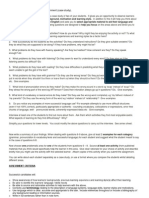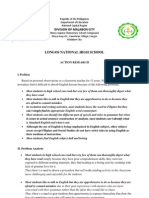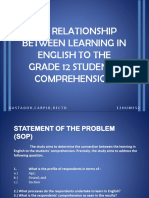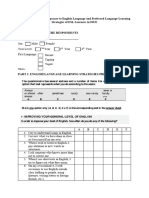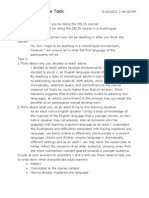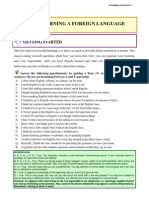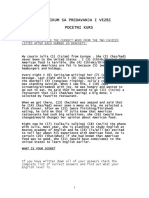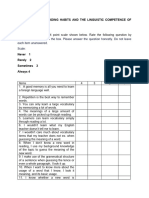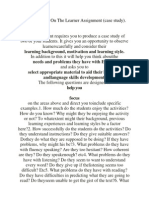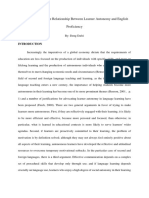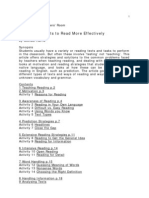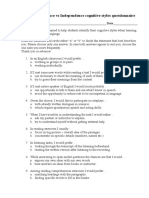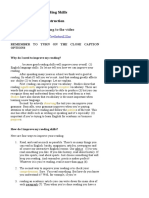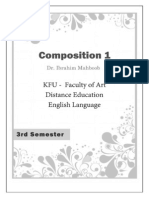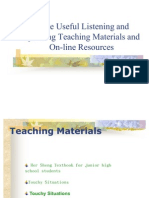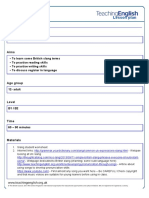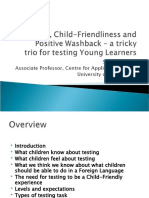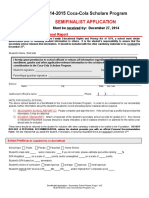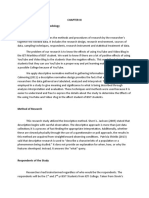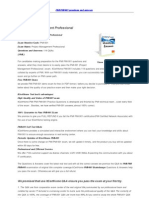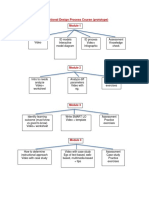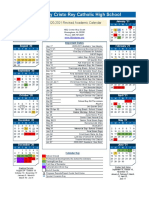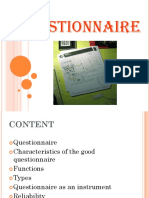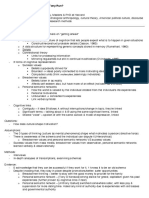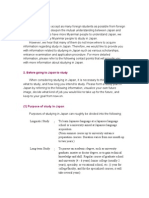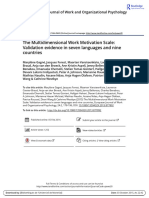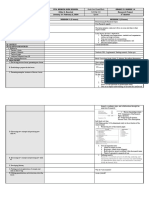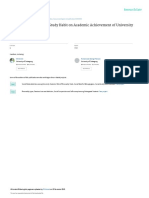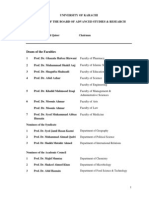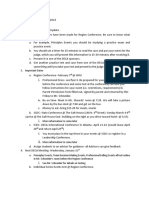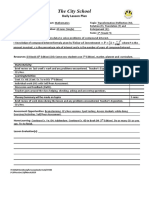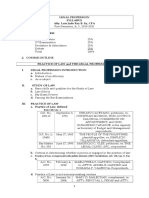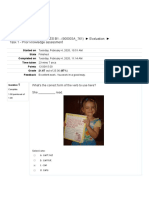Group 6 12 - HUMSS (2) GASTADOR, Mary Ann CARPIO, John Michael RECTO, Kervin Zeus
Group 6 12 - HUMSS (2) GASTADOR, Mary Ann CARPIO, John Michael RECTO, Kervin Zeus
Uploaded by
Kerv ZeusCopyright:
Available Formats
Group 6 12 - HUMSS (2) GASTADOR, Mary Ann CARPIO, John Michael RECTO, Kervin Zeus
Group 6 12 - HUMSS (2) GASTADOR, Mary Ann CARPIO, John Michael RECTO, Kervin Zeus
Uploaded by
Kerv ZeusOriginal Description:
Original Title
Copyright
Available Formats
Share this document
Did you find this document useful?
Is this content inappropriate?
Copyright:
Available Formats
Group 6 12 - HUMSS (2) GASTADOR, Mary Ann CARPIO, John Michael RECTO, Kervin Zeus
Group 6 12 - HUMSS (2) GASTADOR, Mary Ann CARPIO, John Michael RECTO, Kervin Zeus
Uploaded by
Kerv ZeusCopyright:
Available Formats
GROUP 6
12 –HUMSS (2)
GASTADOR, Mary Ann
CARPIO, John Michael
RECTO, Kervin Zeus
TOPIC:
Education
(POSSIBLE) TITLE:
The Relationship between English Learning and Grade 12 Student’s Comprehension
STATEMENT OF THE PROBLEM:
- Is there a significant relationship between learning in English and student’s comprehension?
- Is there a direct effect of learning English and student’s comprehension?
- Is there a significant difference between learning in English and student’s comprehension?
RESEARCH QUESTIONS:
- How often does the participant assessed their selves on their own:
1.) How often the participant does assess their selves by reading?
2.) How often the participant does assess their selves by speaking?
3.) How often the participant does assess their selves by writing?
INSTRUMENTS:
1. What is the profile of respondents in terms of:
a.) Age;
b.) Strand; and
c.) Section
QUESTIONNAIRE ABOUT THE LEARNING OF ENGLISH
With this questionnaire we would like to know what you do on your own initiative when you use or
learn English (at home or in class). There are no true or false answers so it is important that your
answers are about what you think. Your answers will be treated confidentially.
Choose the option that best represents what you do according to this scale:
A - Always B - Often C - Sometimes D – Rarely E – Very Rarely F - Never
Mark one option only (A, B, C, D, E or F) in the corresponding slot in the answer sheet.
Example: look at the following answer (E) from someone who does not have the habit of reading the
newspaper every day:
I read the newspaper A B C D E F
1. I pay attention to the errors that I make when I write or speak in English.
2. I review what we have done in class or I test myself on my own.
3. When I read or listen to English, I pay attention to new words or structures.
4. I ask someone who knows more than me to correct me.
5. At home I make lists of words and I study them.
6. I write down the word together with an example sentence.
7. I create my own dictionary.
8. I relate the word in English with an image, a drawing or a scheme.
9. I repeat the words out loud several times.
10. I write summaries or outlines of the structures that we are learning.
11. I review the structures mentally or out loud.
12. I memorize example sentences in order to remember some grammar points.
13. Before I start reading, I look at what the text is about.
14. I try hard to understand the text word by word.
15. I look up the words of almost all new words in the dictionary.
16. I pay attention to the grammar when I write.
17. I write new sentences based on structures or set phrases that I have memorized.
18. I reread what I have written before I go on writing.
19. I review what I have written carefully.
20. Before speaking, I think what I am going to say in English.
21. I listen with attention.
Thanks a lot for your cooperation!!!
(http://www.ubgral.com/uploads/1/8/7/6/18768214/___foreign_language_learning_strategies_questio
nnaire_in_english_by_m._victori_and_e._tragant.pdf)
You might also like
- CELTA Focus On The Learner AssignmentDocument5 pagesCELTA Focus On The Learner Assignmentgareth11895% (85)
- Gap Finder AssessmentDocument10 pagesGap Finder Assessmentapi-320988168No ratings yet
- Celta Precourse TaskDocument22 pagesCelta Precourse Taskdowdmarie100% (48)
- Action Research For Filipino English TeachersDocument7 pagesAction Research For Filipino English TeachersDezmein100% (5)
- Focus On The LearnersDocument3 pagesFocus On The LearnersMeriel Rhodes100% (4)
- Powerpoint RDLDocument8 pagesPowerpoint RDLKerv ZeusNo ratings yet
- CELTA Pre Course TaskDocument9 pagesCELTA Pre Course TaskDoğa Erkan DozzoNo ratings yet
- Celta TaskDocument15 pagesCelta TaskBelinda Jane82% (33)
- Final Questionnaire1Document6 pagesFinal Questionnaire1shanbarut30No ratings yet
- Engleski Jezik IDocument75 pagesEngleski Jezik IMilica JovićNo ratings yet
- Contact Us ADocument226 pagesContact Us AVlad ZolotarNo ratings yet
- CELTA Pre-Course TaskDocument6 pagesCELTA Pre-Course TaskseanbrennanNo ratings yet
- Phonetics FinalDocument17 pagesPhonetics FinalNiza CarledNo ratings yet
- UNIT 1 Learning A Foreign LanguageDocument15 pagesUNIT 1 Learning A Foreign LanguageLourdes Ballesteros SantosNo ratings yet
- CELTA 2019 Pre-Course TaskDocument19 pagesCELTA 2019 Pre-Course TaskmuhammadNo ratings yet
- Praktikum Predavanja I Vezbi Pocetni KursDocument118 pagesPraktikum Predavanja I Vezbi Pocetni KursSeminarski radoviNo ratings yet
- Curs IDocument142 pagesCurs IBrigittaNo ratings yet
- Santuele Survey Questionnaire 3Document12 pagesSantuele Survey Questionnaire 3Pamela Faith SantueleNo ratings yet
- ExcerptDocument10 pagesExcerptJames Carey GirlingNo ratings yet
- Celta AssignmentDocument13 pagesCelta Assignmentshilpadub100% (2)
- Testing VocabularyDocument5 pagesTesting VocabularyAnamie Dela Cruz ParoNo ratings yet
- Research Questionnaire Template Grade 10 AvDocument2 pagesResearch Questionnaire Template Grade 10 AvArmistice100% (1)
- 06 - Unit I Lesson 2Document7 pages06 - Unit I Lesson 2Hansjeio Miro LebiteNo ratings yet
- QuestionnaireDocument6 pagesQuestionnairesugurugeto131No ratings yet
- Approaching A First Class With A New GroupDocument5 pagesApproaching A First Class With A New GroupMihaela Constantina VatavuNo ratings yet
- Helping Students To Read More EffectivelyDocument27 pagesHelping Students To Read More EffectivelypanaceusNo ratings yet
- Tugas 1 Esp Musdalifah Bc73 1847242028Document7 pagesTugas 1 Esp Musdalifah Bc73 1847242028musdalifah 940No ratings yet
- Field Dependence Vs Independence Cognitive Styles QuestionnaireDocument3 pagesField Dependence Vs Independence Cognitive Styles QuestionnaireZulfiya ZNo ratings yet
- A Few Bugs in English WritingDocument2 pagesA Few Bugs in English WritingEri Kurniawan100% (1)
- ISE I - Independent Listening Task 2 - CA1 (Learning A Foreign Language) PDFDocument14 pagesISE I - Independent Listening Task 2 - CA1 (Learning A Foreign Language) PDFLizbeth Gil100% (1)
- Always Never or or Almost Always Often Sometimes Rarely Very Rarely HardlyDocument4 pagesAlways Never or or Almost Always Often Sometimes Rarely Very Rarely HardlyQuỳnh HoaNo ratings yet
- Reading Comprehension Week 7-10 GradeDocument4 pagesReading Comprehension Week 7-10 GradeJames Galeano MolinaNo ratings yet
- English-Phobia: Causes and RemediesDocument3 pagesEnglish-Phobia: Causes and RemediesEditor IJTSRDNo ratings yet
- Do You Have Any Special Tricks/ways of Learning English Words That Help You To Remember and Use Them? If Yes, List Your WaysDocument3 pagesDo You Have Any Special Tricks/ways of Learning English Words That Help You To Remember and Use Them? If Yes, List Your WaysAnna MusińskaNo ratings yet
- Composition 1 PDFDocument32 pagesComposition 1 PDFLatasha ConnerNo ratings yet
- Zero Prep CataDocument5 pagesZero Prep Catazer03210% (1)
- Guidelines For EFL StudentsDocument11 pagesGuidelines For EFL Studentsdee dee johnsonNo ratings yet
- 1st Grade Ela q1 Performance TaskDocument10 pages1st Grade Ela q1 Performance Taskapi-143406529No ratings yet
- AppendicesDocument16 pagesAppendicesinggitNo ratings yet
- LLP Adquisicion 2014 1 1Document9 pagesLLP Adquisicion 2014 1 1api-257924107No ratings yet
- 2017-06. Tania Escalona OstaléDocument8 pages2017-06. Tania Escalona OstaléTani Tania TaniaNo ratings yet
- Three Strategies For Teaching Grammar in ESL: July 5, 2012 IxchellDocument24 pagesThree Strategies For Teaching Grammar in ESL: July 5, 2012 IxchellJett RoyNo ratings yet
- Reading Texts CriticallyDocument19 pagesReading Texts CriticallyKasnhaNo ratings yet
- RealReading TM1-1Document46 pagesRealReading TM1-1Therese Kuenzler-FretzNo ratings yet
- English Language Needs Analysis QuestionareDocument3 pagesEnglish Language Needs Analysis QuestionareMichaellah O. AmbalongNo ratings yet
- Suggested Teaching Strategies Developing Oral Skills in A Second LanguageDocument8 pagesSuggested Teaching Strategies Developing Oral Skills in A Second Languageiam yourqueenNo ratings yet
- Help Sts Enjoy GrammarDocument5 pagesHelp Sts Enjoy GrammarNasr-edineOuahaniNo ratings yet
- Latifah Syuhada: Reflections From Teachers and Students On Speaking Anxiety in An EFL ClassroomDocument19 pagesLatifah Syuhada: Reflections From Teachers and Students On Speaking Anxiety in An EFL ClassroomJohan PratamaNo ratings yet
- How To Learn EnglishDocument17 pagesHow To Learn EnglishMohamad HafizNo ratings yet
- Testing VocabularyDocument44 pagesTesting Vocabularyjavier garzon ramosNo ratings yet
- Assignment 1 EappDocument10 pagesAssignment 1 EappCarrie Lhee BoadoNo ratings yet
- Listening and Speaking Teaching Materials and On-Line ResourcesDocument42 pagesListening and Speaking Teaching Materials and On-Line Resourcesnicelucky1No ratings yet
- Untuktugas AssesmentDocument18 pagesUntuktugas AssesmentQueensya QaireenNo ratings yet
- Eapp Task 2 - Read and Evaluate TextsDocument4 pagesEapp Task 2 - Read and Evaluate TextsGerald PalmaNo ratings yet
- ELT Advantage TEYL Objectives and AssignmentDocument7 pagesELT Advantage TEYL Objectives and AssignmentRomina Gavancho ValderramaNo ratings yet
- Slang Lesson PlanDocument4 pagesSlang Lesson PlanPaola CorsiNo ratings yet
- Shelagh Rixon Associate Professor, Centre For Applied Linguistics University of Warwick UKDocument48 pagesShelagh Rixon Associate Professor, Centre For Applied Linguistics University of Warwick UKKhalid QasrawyNo ratings yet
- TKT Unit 3Document41 pagesTKT Unit 3Jelena MitrovicNo ratings yet
- I Hate English CourseworkDocument6 pagesI Hate English Courseworkf67m6abx100% (2)
- Fifty Ways to Practice Vocabulary: Tips for ESL/EFL StudentsFrom EverandFifty Ways to Practice Vocabulary: Tips for ESL/EFL StudentsRating: 4 out of 5 stars4/5 (20)
- 2015 SF Secondary School ReportDocument2 pages2015 SF Secondary School ReportJordan LutyNo ratings yet
- France Grading SystemDocument6 pagesFrance Grading SystemClara AlbertNo ratings yet
- Chapter IiiDocument6 pagesChapter IiiDante EcaranNo ratings yet
- PMI 001 ItcertDocument5 pagesPMI 001 ItcertNainaSiingh100% (1)
- Prototype ExampleDocument2 pagesPrototype Exampleapi-347025390No ratings yet
- HUM 120-91 Syllabus SupplementDocument7 pagesHUM 120-91 Syllabus Supplementglyph65No ratings yet
- PHD Ordinances 2Document14 pagesPHD Ordinances 2Smit PatelNo ratings yet
- 2020-2021 Academic CalendarDocument1 page2020-2021 Academic CalendarHoly Family Cristo Rey Catholic High SchoolNo ratings yet
- Questionair DesignDocument18 pagesQuestionair Designmoeen.tariq9252No ratings yet
- What Makes Tony Run PDFDocument1 pageWhat Makes Tony Run PDFJeri Maia LorescoNo ratings yet
- Lesson 5 Creative WritingDocument41 pagesLesson 5 Creative Writingantoniagabriel salinasNo ratings yet
- Stady in JapanDocument9 pagesStady in JapandoosrglnNo ratings yet
- Multidimensional Work Motivation ScaleDocument20 pagesMultidimensional Work Motivation ScaleAdrianaSaidizaNo ratings yet
- Daily Lesson LOG: I. ObjectivesDocument3 pagesDaily Lesson LOG: I. ObjectivesGilda BacolodNo ratings yet
- Biology Course Sylllabus (Amended) Pope John XXIII High SchoolDocument10 pagesBiology Course Sylllabus (Amended) Pope John XXIII High Schooldwr135No ratings yet
- Learning Journal Assignment Reflection 1Document4 pagesLearning Journal Assignment Reflection 1Kim NguyễnNo ratings yet
- PMP Lesson LearnedDocument16 pagesPMP Lesson Learnedpratikkange@gmail.comNo ratings yet
- Role of Self-Esteem and Study Habit On Academic Achievement of University StudentsDocument13 pagesRole of Self-Esteem and Study Habit On Academic Achievement of University StudentssanaNo ratings yet
- CE 375 E S R S: Class Lectures: Days: Time: Building: Room: InstructorDocument7 pagesCE 375 E S R S: Class Lectures: Days: Time: Building: Room: InstructorHong VeasnaNo ratings yet
- Procrastination Complete (Thesis)Document23 pagesProcrastination Complete (Thesis)Villegas DietherNo ratings yet
- Northwestern State University Department of Social Work Proctoring Policy All ExamsDocument2 pagesNorthwestern State University Department of Social Work Proctoring Policy All Examsochoajulie87No ratings yet
- ProspectusDocument17 pagesProspectusHassan AliNo ratings yet
- Agenda 3Document1 pageAgenda 3api-17892361No ratings yet
- The City School: Daily Lesson PlanDocument5 pagesThe City School: Daily Lesson PlanThe City SeniorNo ratings yet
- AU305 Vehicle MaintenanceDocument2 pagesAU305 Vehicle MaintenancevaisakmctNo ratings yet
- Academic and Administrative Audit (AAA) - Knowledge Consortium of Gujarat (KCG) - 3Document29 pagesAcademic and Administrative Audit (AAA) - Knowledge Consortium of Gujarat (KCG) - 3provcNo ratings yet
- Legal Profession Syllabus 1Document2 pagesLegal Profession Syllabus 1SERVICES SUBNo ratings yet
- An Income Generating Project: "Oyster Mushroom Production"Document13 pagesAn Income Generating Project: "Oyster Mushroom Production"Roweon Jin Tabag100% (5)
- Accounting Research I Prelim Examination Name: Aeron Rai Roque Time: February 17, 2021 ScoreDocument2 pagesAccounting Research I Prelim Examination Name: Aeron Rai Roque Time: February 17, 2021 ScoreAeron Rai RoqueNo ratings yet
- Task 1 - Prior Knowledge AssessmentDocument7 pagesTask 1 - Prior Knowledge AssessmentClaudia Janeth Rivera FuentesNo ratings yet
